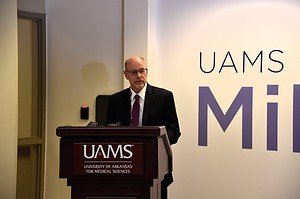Brittni Littlejohn, assistant professor of animal science for the research arm of the University of Arkansas System Division of Agriculture, and her collaborators were awarded the grant by the USDA’s National Institute of Food and Agriculture to continue evaluating the use of melatonin in pregnant cows to offset the long-term effects on calves when their mothers graze toxic fescue.
Tall fescue is the most common cool-season forage in the southeastern United States. However, it is often infected with an endophyte fungus that produces ergot alkaloids that are toxic to grazing animals and cause constriction of blood vessels. In a preliminary study for the experiment station, Littlejohn saw decreased uterine artery blood flow in pregnant heifers that consumed toxic fescue seed when compared to endophyte-free fescue seed.
A complex system
The preliminary study also showed calves born to heifers that consumed toxic fescue seed weighed an average of 90 pounds lighter at weaning than those born to heifers that consumed endophyte-free fescue seed during gestation. The effects of the toxic fescue to decrease weight gains continue through yearling age, and ongoing research is evaluating performance of these calves in the feedlot, she added.
Prior research by Littlejohn has shown the potential for melatonin administered to pregnant cattle to improve growth performance of calves. Specifically, melatonin tended to improve birth weights of calves, and significantly improved weaning and post-weaning weights of calves whose mothers consumed toxic fescue seed during gestation, she said.
Supporting evidence from her first study showed that pregnant heifers fed melatonin as a supplement led to recovery of more than 70 percent of the loss in weaning weights of calves whose mothers were fed fescue seed infected with the fungus-produced ergot alkaloid.
“We're working to understand and separate out the impacts on the calf that are directly due to changes in the prenatal environment, such as reduced blood flow to the uterus, versus effects on the mother’s physiology after birth, such as milk production, that may indirectly impact the calf,” Littlejohn said.
The current study began in May with a 70-day treatment period where mature pregnant cattle grazed either toxic fescue or endophyte-free fescue pastures and were supplemented with or without melatonin. Uterine and tail artery blood flow, as well as milk yield and composition, are being evaluated in cows from each treatment. Calves born to cattle from each treatment will be evaluated for differences in metabolic function, microbiome populations and feed efficiency to better understand factors influencing potential differences in calf growth.
The two-year experiment is being conducted at the Livestock and Forestry Research Station in Batesville.
“The current study is still preliminary, but it is one step closer to the producer,” Littlejohn said. “This is more of a true field study, where those pregnant cows are consuming toxic fescue in a grazing scenario.”
The study will also look at melatonin's potential side effects on the calves.
"There are no known adverse effects, but to our knowledge this is the first time melatonin supplementation has been studied in pregnant cows consuming toxic fescue, and it's a very complex system, so we are closely monitoring animals for potential adverse effects," Littlejohn said.
Because melatonin and toxic fescue have been independently associated with changes to the microbiome, Littlejohn said fecal samples will be collected from pregnant cows and calves born to those cows at various intervals for microbiome analyses.
The melatonin will be given to the pregnant cows in their feed at a dose similar to naturally occurring nighttime levels. Although melatonin is known to help people go to sleep, Littlejohn said she has not observed the cows nodding off in the middle of the day.
The groundwork on this patent-pending protocol shows that melatonin supplementation in pregnant cattle grazing toxic fescue has the potential to improve offspring growth performance and increase producer return on investment.
"We hope to not only start filling a profound gap in the current literature, but also test the potential of melatonin as a cost-effective therapeutic," Littlejohn said.
Division of Agriculture co-investigators include Shane Gadberry, professor, extension livestock specialist, and director of the Batesville research station; Beth Kegley, professor of animal science; Jeremy Powell, professor of animal science; Jiangchao Zhao, professor of animal science. Ken Coffey, an animal science professor with the experiment station.
Co-investigators in the study include Mississippi State University's Rhonda Vann, research professor of cattle growth physiology, and Caleb Lemley, associate professor of reproductive physiology. The sub-award to Mississippi State University researchers is $15,000.
The study is supported by USDA-NIFA grant number 2023-67016-39661. The USDA's National Agricultural Statistics Service ranks Arkansas 11th in the nation in beef cows that have calved and beef cow replacement heifers, according to the 2023 Arkansas Agricultural Profile published by the Division of Agriculture.
To learn more about Division of Agriculture research, visit the Arkansas Agricultural Experiment Station website: https://aaes.uada.edu. Follow on Twitter at @ArkAgResearch. To learn more about the Division of Agriculture, visit https://uada.edu/. Follow us on Twitter at @AgInArk. To learn about extension programs in Arkansas, contact your local Cooperative Extension Service agent or visit www.uaex.uada.edu.





















